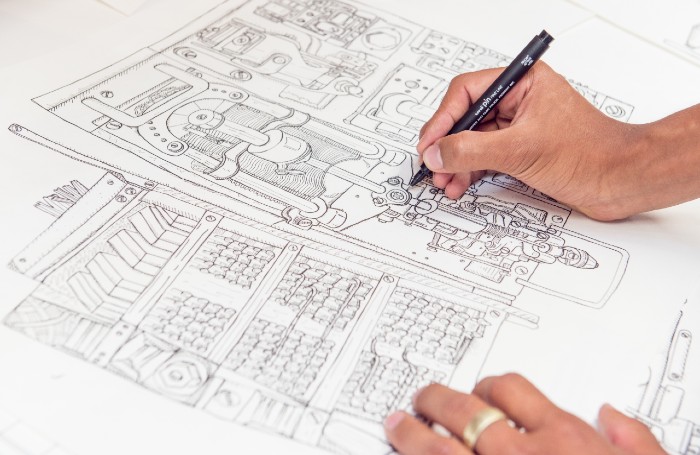For every student, apprentice, and academic in architectural education throughout the UK, the last few weeks have been puzzling, stressful and unpredictable. We’re all reacting in different ways to this crisis, mostly with concerns for the wellbeing of family and friends. Being confined to our homes more than is usual and losing physical touch with our social circle are also new challenges we’re adapting to.
The RIBA understands that – irrespective of which part of the programme they’re studying –everyone in a school of architecture has worries about completing their work. People are concerned how their submissions will be taught and assessed, whether the usual deadlines will apply, and the effect this will have on their studies and employment.
The RIBA has no greater ability to foresee the future of this pandemic than any other organisation, news source or independent commentator. However, we’re offering some common sense advice for everyone in UK schools of architecture, accepting that as the situation develops, we will review and revise what we’ve said – and provide more help.

Part 1 and Part 2 students and apprentices who are not scheduled to graduate this year
- Focus on the long view: you need to stay focused on being successful with your studies this academic year. Remember that although the present situation is a challenge, your future is more important. What you do now will have implications for your degree, and your employment in the profession.
- Moving online: with the recent closure of all UK universities, teaching has moved online. You should now all be able to talk to your tutors and lecturers online with a video and audio link. If you don’t yet have this set up, please ask your school how to do it; there are helplines on your school and university websites. If you don’t have access to a computer, please make your tutors aware of this as soon as possible.
- Media and representation: university closures will affect your ability to produce 3D analogue and physical models, so consider instead how you’ll represent the same ideas entirely through drawing (or whatever materials you have at home).
- Showing up and submitting: When your tutors schedule virtual meetings with them, please make sure you ‘attend’. You need to ensure you receive clear feedback from your tutors, and know what to do next. Structure each day to achieve defined goals (even if they’re modest), critically reflecting on what you’ve achieved. Stick to set submission dates for your work. Instead of asking whether your deadline should be moved, plan for hitting that deadline as effectively as you can.
- Don’t forget your classmates: A critical part of studying architecture is your peer group – all those friends and colleagues in your studio and lecture room who you learn with and from. Keep in touch with them as regularly as you would in the world outside, exchanging progress updates, information, and support
Part 1 and Part 2 students and apprentices who are scheduled to graduate this year
- Strengthening your degree: it’s particularly important for graduating students to concentrate on working to given deadlines. Your degree needs to be as valuable and strong in its own right, and not compromised by the health crisis. Remote working offers you a unique time to produce a wonderful digital portfolio, which will be the passport to the next stage of your career in architecture. In most schools, there will still be interviews with external examiners at the end of this academic year, even if you’re likely to meet them through a video link. These external examiner interactions are a critical point to work to as they offer you the chance to demonstrate everything you’ve learnt – and how this is expressed through your work.
The big picture: keep in mind that the profession of architecture will still be there when this pandemic ends. There will be economic challenges ahead, but the best practices will still want to recruit the best talent, so nothing has changed. What you do now in your online school will affect your opportunities in the professional context outside, so keep all your big plans in mind, and work to the same goals you had before; your portfolio is as important now as it was before all this happened. Finally, don’t hesitate to get your beautifully written and illustrated CVs to those practices you want to work with.

Part 3 candidates
Understandably, your primary concern, at this time, may be about redundancy, so it’s important to ask what your employer is doing to keep their workforce together – and how this affects you. With construction sites closing, projects you’re working on and using for a part 3 case study could be suspended for some time.
PEDR: use this change in circumstances as an opportunity. You could (for example) describe in detail in your case study: how your practice, its clients, and the design team adapted to the new situation, transitioning to homeworking; what challenges did this create, and what were the implications for business management and resourcing? In other words, you could talk about the professional responses made to complex and unpredictable circumstances.
Examination of Part 3: check with your Part 3 provider that the timeline for your Part 3 submissions, examinations and viva is proceeding as usual. Though it is likely that the format for your exams and viva may change to an online format, the rigour of the process will be no different.
As much as possible, whether you are a Part 1, Part 2 or Part 3 student, try to retain your long-term aspirations for your career; your goal to register as an architect in the UK should not be affected or impaired by this crisis.
RIBA Future Architects is our network and community for future and emerging architects, designed to support, inspire and provide a voice as you transition from study to practice. View our resources.
Article by David Gloster, RIBA Director of Education.









